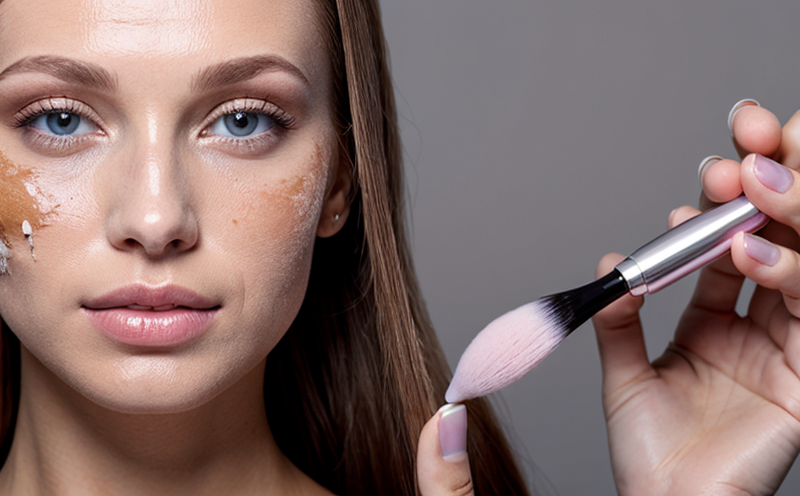Sustainability Compliance Testing in Cosmetics
As consumer awareness of environmental and health concerns continues to grow, regulatory compliance has become a critical aspect of the cosmetics industry. Sustainability compliance testing ensures that products not only meet legal standards but also align with ethical and ecological principles. This service is essential for quality managers, compliance officers, R&D engineers, and procurement teams looking to ensure their cosmetic formulations are both safe and sustainable.
Compliance with sustainability regulations often requires rigorous testing of various components within a cosmetic product. These tests can encompass the sourcing and production processes, the formulation itself, packaging materials, and end-of-life disposal options. The aim is to minimize environmental impact while ensuring safety for consumers. Compliance testing in this area involves evaluating biodegradability, water use efficiency, energy consumption during manufacturing, and the use of sustainable ingredients.
The International Organization for Standardization (ISO) provides a comprehensive framework through standards such as ISO 14020, which defines terms related to environmental labels and declarations. Additionally, ISO 18186 focuses on biodegradability in marine environments, ensuring that products do not harm aquatic ecosystems once they reach waste management facilities or natural water bodies.
For a deeper understanding of the testing process, consider the following scenario: A company aims to launch a new line of shampoos and conditioners. To ensure sustainability compliance, they must evaluate whether the shampoo bottles are made from recycled materials, how much energy is used in their production facility, and what happens when these products reach end-of-life disposal.
Testing for sustainability compliance involves several key steps: - Material Sourcing: Analyzing the origin of raw materials to ensure they are ethically sourced and have minimal environmental impact. - Energy Consumption: Measuring electricity usage in manufacturing processes to identify areas where energy efficiency can be improved. - Biodegradability Testing: Evaluating how quickly a product decomposes under natural conditions, ensuring it does not contribute to pollution.
The testing process for sustainability compliance is highly technical and involves the use of sophisticated instrumentation. For instance, biodegradation tests may utilize incubation chambers that simulate natural environmental conditions. These chambers help determine if the product breaks down within a specific timeframe without leaving harmful residues behind.
Another crucial aspect of this service is understanding the regulatory landscape. Different regions have varying requirements for sustainability compliance. In Europe, the REACH regulation (Registration, Evaluation, Authorisation and Restriction of Chemicals) sets stringent rules on chemical substances used in cosmetic products. Compliance with these regulations ensures that companies avoid prohibited substances and adhere to safety guidelines.
In North America, the FDA's Good Manufacturing Practices (GMP) also play a significant role in ensuring product quality and safety. Additionally, countries like China have specific labeling requirements for imported cosmetics, which must include information about raw material origins and manufacturing processes.
By integrating sustainability compliance testing into their workflows, cosmetic manufacturers can stay ahead of regulatory changes and market trends. This proactive approach not only enhances brand reputation but also fosters customer loyalty by demonstrating a commitment to environmental responsibility.
Scope and Methodology
The scope of sustainability compliance testing in cosmetics is broad and encompasses multiple facets of the product lifecycle, including raw materials sourcing, manufacturing processes, formulation analysis, packaging evaluation, and end-of-life disposal. The methodology employed by our laboratory adheres to international standards such as ISO 14020 for environmental labels and declarations.
Raw Materials Sourcing: We conduct detailed assessments of the origins of raw materials used in cosmetic formulations. This includes evaluating whether they are sustainably sourced, verified through certifications like Fair Trade or Rainforest Alliance, and free from hazardous chemicals.
Manufacturing Processes: Our testing focuses on energy efficiency measures implemented during production. We measure electricity consumption using specialized meters installed at the manufacturing facility. Additionally, we evaluate water usage and waste management practices to ensure minimal environmental impact.
The methodology used by our laboratory ensures comprehensive coverage across all aspects of cosmetic sustainability compliance. By adhering strictly to international standards and employing state-of-the-art equipment, we provide accurate and reliable results that meet regulatory requirements worldwide.
Industry Applications
Sustainability compliance testing in cosmetics has numerous applications across the industry, from product development to supply chain management. Quality managers rely on this service to ensure their products not only comply with legal standards but also align with ethical and ecological principles. Compliance officers use these tests as part of their broader strategy to maintain regulatory adherence.
R&D engineers benefit greatly from sustainability compliance testing by incorporating sustainable practices into new product designs. By understanding the environmental impact of different raw materials and manufacturing processes, they can innovate more eco-friendly products that still meet safety expectations.
For procurement teams, this service plays a vital role in selecting suppliers who adhere to high standards of sustainability. Procuring from certified suppliers ensures transparency regarding material sourcing and production methods, reducing supply chain risks associated with non-compliance.
The testing process itself is intricate but necessary for maintaining the integrity of cosmetic products while addressing global environmental concerns. Here are some specific applications: - Product Development: Identifying sustainable alternatives to traditional ingredients. - Supply Chain Management: Ensuring all suppliers adhere to strict sustainability criteria. - Regulatory Compliance: Meeting legal requirements set by various regions and countries. - Ethical Branding: Demonstrating a commitment to environmental responsibility through product labeling.
By integrating these tests into their operations, cosmetic companies can differentiate themselves in the market while contributing positively to environmental sustainability. This approach not only enhances brand reputation but also fosters customer trust and loyalty.





